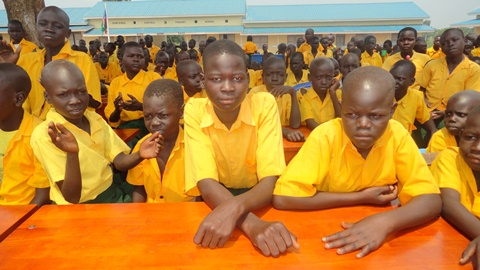2.5 million textbooks distributed to learners in South Sudan
May 23, 2024 (JUBA) – A total of 2.5 textbooks were handed to school leaders in Juba, South Sudan as part of a massive program aimed at ensuring out-of-school children learn.
The textbooks, a statement noted, will play a vital role in the teaching and learning process that gives every child the best possible opportunities for education in the country.
Led by Save the Children in partnership with Norwegian Refugee Council, Finn Church Aid, and the Ministry of General Education and Instruction (MoGEI), and funded by the Education Cannot Wait (ECW) initiative, the learners program is considered one of the most wide-reaching education resourcing initiatives in South Sudan.
ECW is the United Nations global fund for education in emergencies and protracted crises. It mainly supports refugee, internally displaced persons and children affected by crisis.
According to the statement extended to Sudan Tribune, Arabic language and Islamic Religious Education (IRE) textbooks were also printed and launched for the first time.
With funding from ECW’s Multi-Year Resilience Programme (MYRP) for South Sudan, this recent distribution of 2.5 million textbooks adds to the already distributed 1.12 million textbooks, making a total of more than 3.5 million textbooks distributed since 2021, it said.
These textbooks are crucial in the teaching and learning process, ensuring more children, regardless of their background, can have the best possible opportunities for education.
An estimated 2 million internally displaced and returnees’ children, along with nearly 41,000 teachers, all require education-related humanitarian aid in South Sudan. These needs are diverse and necessitate comprehensive, multi-sectoral interventions, particularly in hard-to-reach areas. Lack of enough teaching materials, such as text books, has contributed to these children, with girls comprising 53 percent, facing significant barriers to accessing education. Notably, children with disabilities, especially those in crisis-affected areas, continue to lack adequate learning support for quality education”, said Ahmed Omar Ibrahim, Save the Children’s Acting Country Director.
“Save the Children is committed to improving access to safe and conducive learning environments for vulnerable groups, particularly internally displaced persons (IDPs) and returnees. In 2024, approximately 41,000 teachers, primarily in hard-to-reach areas, will require support with teaching materials and incentives to ensure quality education. The textbooks increase learning materials for students, including those in early childhood education,” he added.
Hussein Abdelbagi Akol, South Sudan’s vice president for service delivery cluster in the Republic of South Sudan, flagged out the textbooks for distribution under the theme; “An Inclusive National Curriculum for Transforming Education in South Sudan.”
“The launch of Arabic Language and Islamic Religious Education is an achievement; it reaffirms the commitment to providing quality education for all. There will be a challenge in teaching this textbook if we don’t have enough teachers, so I encourage the Ministry to focus on ensuring that there are available teachers to teach Arabic Language and Islamic Religious Education,” he stressed.
South Sudan’s General Education and Instruction minister, Awut Deng Achuil, said, “The 2.5 million textbooks that we are distributing to schools this morning will contribute to reducing the pupil-textbook ratio. When I came to the office, it was 1 to 19 learners per textbook in core subjects such as English language and mathematics; today, it is three learners per book; this is not good enough; my objective is one school child per textbook.”
Last year, Save the Children reached nearly 70,000 children with education support.
(ST)

